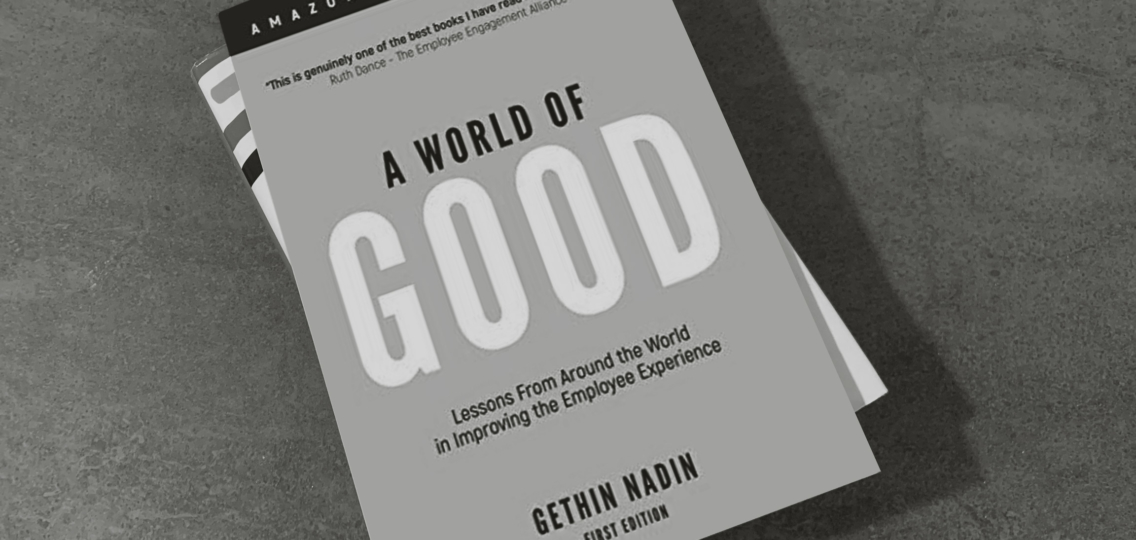With summer holidays upon us and a potential staycation on the horizon, we thought we’d share one of our book recommendations. It’s time to pop up your deckchair, get comfy and kick back with a good book.
This month, I share my thoughts on A World of Good: Lessons from around the world in improving the Employee Experience, by Gethin Nadin.
The more we understand what good employee experience looks like, the better ours and our colleagues can be – we can all influence positive change, even within our immediate teams. Eximia advocate for everyone to #ChallengeTheProcess. We believe we should all use our voice to champion better workplace experiences.
We’re witnessing the start of a great workplace transformation. The pandemic has been the catalyst for shifting the employee experience further, with a greater focus on wellbeing, belonging (diversity equity and inclusion ‘DEI’) and hybrid working – all of which we’re busy helping clients communicate.
None of these things are new. But, our collective global experience of the pandemic has sharpened our focus, and far more employers are giving these areas of the employee experience greater attention.
As we look ahead with some optimism and the likelihood that vaccinations will bring us more freedom, it’s a great time to reflect on the employee experience prior to the pandemic compared to where we are now. So, if you are interested in improving employee experience and engagement, ‘A World of Good’ makes for an absorbing read.
Three key learnings
After reading the book, here are the three key chapters I think are particularly relevant right now:
1. Swedish ‘Fika’ time – having coffee and connecting
The book shares that studies have shown frequent breaks, switching tasks, and varying levels of concentration improve focus and creativity – give that some thought when you or your colleagues try to plough through a job without breaks.
Placing emphasis on ‘mindfulness’ and taking short periods to be present helps us perform better. Also, the part of our brain that deals with complex problem-solving activates when we let our minds wander and ‘daydream’. So, switching to more straightforward tasks for short periods can help. An excellent way to achieve this is to socialise with colleagues because human contact releases oxytocin in the brain – something we’ve missed when working remotely.
If your organisation is considering hybrid working, then perhaps this is something to keep in mind.
My advice – create your fika moments to help mental wellbeing and productivity – the more refreshed, relaxed, and connected we are, the better.
2. Japanese ‘Ikigai’ – our reason for being
According to A World of Good, finding our Ikigai or purpose requires self-discovery, but doing so can bring great satisfaction. Rather than just looking at the end goal, there’s an emphasis on looking back at our successes and identifying what we’re good at and what we enjoyed.
Pride plays a crucial role in our lives, and this feeling spikes our testosterone levels – so having pride in the organisation we work for is key to greater engagement. If its purpose is clear and there’s a link to being socially conscious and helping others, plus relatable values, this helps us feel greater ikigai and meaning. This, in turn, has been linked to improved mental health.
My advice – with us all experiencing significant change right now, maybe there’s an opportunity for you and your team to find time for reflection. Look at past successes to increase your sense of pride and identify your values to see if they align with your organisation. When we’re in sync, we can get closer to an improved sense of purpose and a better employee experience.
3. Danish ‘Tillis’ – trust
In Denmark, employees appear to have the most trust as it’s the foundation of Danish society.
When working, they focus on the results instead of focusing on the time and place where work is carried out. Employees are trusted, work-life balance is increased, and productivity levels remain unaffected.
Denmark has some of the highest employee satisfaction statistics in the world. Like other Nordic countries, Denmark has high global competitiveness, human development and prosperity. There’s a huge level of transparency, which empowers people to perform better.
Research has shown that the best way to build trust is through emotional connection. Demonstrating our warmth is the most impactful way to influence somebody’s opinion of us – it’s what we identify with the quickest.
My advice – trust builds compassion, encourages collaboration and creativity. Be open and honest with your employees and focus on clear communication. What can you do today that builds greater trust?
My lessons from around the world
The book was a great eye-opener and gave me countless ideas on how to improve the workplace experience.
As a communication and engagement geek, I already knew that excellent employee experience, work satisfaction and engagement are the holy grail. Still, having a sense of purpose, belonging and meaning at work is crucial to our mental health. We strive for happiness, and in turn, we give more discretionary effort. What I’ve also learned reading this book is that everyone’s experience is different, and there are a vast number of global nuances and local practices to be mindful of when considering making changes or communicating in a global organisation.
We hope you enjoy some well-deserved time out over the summer and manage to decompress. If you’re interested in reflecting on what’s important to you and your employee experience, ‘A World of Good’ will make for the perfect holiday companion.
And, of course, since we’re passionate about communication, we’d also suggest sharing this with your team and chat about ways you can collectively make a difference.



